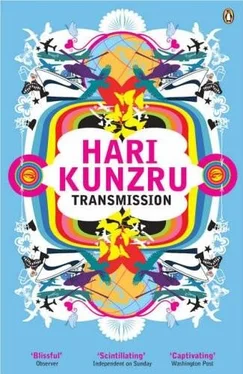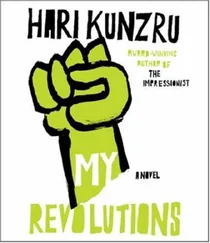
Guy was sitting next to Gabriella in a booth at Sake-Souk, a newly opened Mayfair restaurant. Whenever a waiter came by, he was witty and she dispensed one of her vivid smiles, but as soon as they felt they were not being observed they lapsed into uneasy silence, chewing their way through the chef’s Japanese — Lebanese fusion food as if oblivious to its trendsetting collisions of taste and presentation.
Guy watched the evening traffic through the restaurant’s front window, the yellow lights of taxis, the sleek European cars delivering their occupants to places of discreet entertainment. He was thinking about money, its generation and decay. Specifically about his money, which was unaccountably refusing to regenerate at the required rate. He was a man with overheads. He glanced back at Gabriella, who was pushing an aubergine and chickpea drag-onroll around her plate and staring inscrutably at a point behind his shoulder. She looked beautiful. Her hair and eyes and nose and teeth. He put a hand down on the banquette, next to her thigh. He had not mentioned his money troubles; Gabriella could sense neediness and did not tolerate it very well. He wanted to touch her, but it felt unwise. Gaby could do this, generate invisible armour for herself.
Realizing she was being watched, Gabriella smiled and ran a self-conscious hand through her long brown hair. Guy smiled back, trying to feel reassured. She really was the best-looking girl in the restaurant. When he first saw her at the Film Fund party, he had hoped she would be the one, by which he meant the one who would become the centre of his life, or at least would be located at the centre of the several intersecting value circles which he visualized as defining his life. He risked slipping a hand on to her lap, sliding his palm over the sheer surface of her skirt. She put a hand over it and patted. He was not sure how to interpret this.
Gabriella was too caught up in her own reflections to notice Guy’s anxiety. She had got lost in the restaurant’s dark wood and white linen interior, a world in which space occurred in discrete platonic units, boxes of vacancy. She watched Guy take a bite of his hamachi kebab, making that irritating clicking sound with his teeth. Across the room a man was staring at her. She did not feel hungry.
When people were looking for a comparison for Gabriella, they usually went for Audrey Hepburn. She had the same high cheekbones and air of aristocratic startledness, of having been marooned wherever you encountered her, a refugee from a better, gentler place. But, unlike Hepburn, there was a rough edge, a raggedness of chewed nails and cigarette smoke which gave her an air of potential promiscuity that Guy (among many others) found irresistible. Gabriella knew this. She had learned about irresistibility aged twelve, when a friend of her mother tried to kiss her at the zoo. In the reptile house.
A multiplication of boxes. Nothing but trouble, really.
The previous night she had stayed up late with Sophie, her friend from the Sussex boarding school where she had spent an unhappy year trying to do A levels. Gaby had had a bad time because of food and boys and being foreign. Sophie had had a bad time because of food and no boys. They sat opposite each other on the tropical hardwood floor of Guy’s flat, comfortably occupying their old roles: Sophie watching Gaby do something, in this case chopping out lines of coke on a framed photograph of herself and Guy diving in the Red Sea. ‘You look so happy in that picture,’ she said. Sophie said things like that. You have such nice eyes. That is such a pretty dress. It was one of the things which made them friends.
Gaby looked down at the two people in the photograph, at their salty hair and the masks perched on top of their heads, and tried to remember what the one who was her had felt. Careful to keep her hair out of the way, she did a line and from between pinched nostrils told Sophie, ‘He’s being such an idiot at the moment.’
Sophie was always eager to hear dirt about Guy, who misheard what she said and looked over her shoulder at parties. She rolled her eyes sympathetically and waited for more. Gaby passed her the rolled-up note.
Guy had put the picture up. It was evidence: that they were together and this was their place, that because of shared memories as demonstrated in Exhibit A they also had a future. For her part, Gaby mistrusted snapshots. She possessed very few of her own, perhaps a dozen recorded instants of time which she could not fit together to make a pattern, let alone a life. Herself, five years old on the gangplank of a yacht in Greece, holding the hand of the captain. As a baby on a rug in the apartment in Vienna. Spindly angry thirteen by a hotel pool in Singapore. There was one of her parents getting married, an ostentatious eight-by-ten which had run in a magazine. They wore the flamboyant hats and collars and scarves of 1971 and were surrounded by people. To Gaby it looked no more or less than it was. Financier marries fashion model, turn to page 86. There was one of her sister too, squinting into the camera somewhere hot and dry.
She had always been in motion, even when they were all together. Money moved her. First it was her father’s; later it belonged to her mother’s boyfriends. It took her to various places in which had existed various versions of herself, each furnished with a nanny and a school and an address to memorize and another set of little girls to invite to a birthday party in an expensive restaurant where there was always a clown and no one laughed. There was only one constant: sooner or later everyone and everything was left behind.
By the time she was sixteen her father was a man she met in hotels and her mother was thinking of marrying again, so on a whim she asked to go to boarding school. An English girls’ school like the ones in books. At the time everyone thought it was the perfect solution. After it didn’t work out there was Lausanne and Paris and her own modelling and a Brazilian photographer boyfriend and too many drugs, but weirdly it was her sister, the self-sufficient one who shouted at her mother about guilt and responsibility, who took the overdose. Caroline’s movement had mostly been across Asia. Beaches and ashrams. Jewellery-making. Towards the end it accelerated, took on the quality of flight. By then she was back in Europe and always part of a group, as if she needed people as ballast, numbers to hold her down. Political and religious groups. Self-actualization. Healing. There were retreats and communes. Fasting and chanting. Then sleeping pills on the bathroom floor of a farmhouse in, where was it, Andalusia? It had been hard to find out exactly why she had gone there. Like so many events in Gaby’s life, Caroline’s death made no particular sense. It was just a thing.
Her parents spent the funeral politely convincing each other the death was accidental, though Gaby knew how the money had hounded Caroline, how she hated it for making her life into a game. Watching the two of them edit the story to suit themselves made them so terrible in her eyes that she left Firenze that afternoon and for good measure left Paris and the photographer too and somehow London was where she ended up.
Sophie chattered, taking gulps of Chardonnay and rubbing her nose with her fingers. ‘I don’t know why you stay with him. Of course he’s rich and everything. Or at least he seems rich. You can’t tell with men these days. One minute they are, then you discover they’re not.’
Gaby looked at her with a twinge of distaste. Underneath its crown of expensively streaked hair her face was flushed with wine and cocaine. Pink patches mottled her neck and cheeks, giving her the appearance of a side of marbled beef. She had, Gaby reflected, got bigger since school. Now a size eighteen with a pure maths degree, she combined high earnings as a telecoms analyst with a bleak and hostile view of men. In her Fulham townhouse there was a walk-in closet filled with shoes, tiny pointy confections of silk and leather which cost hundreds of pounds a pair and made her feet hurt. Gaby looked at the twin plasters on her friend’s bare heels. Poor Sophie, with her dreams of daintiness.
Читать дальше












